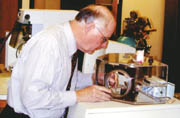
Using the proven technique of differential scanning calorimetry (DSC), a new service offered by Impact Analytical, Midland, Mich., allows determination of absolute purity based on the well-recognized premise that even small amounts of impurities lower the melting point of a material and broaden its overall melting range. With standards of known purity not readily available for many pharmaceutical and organic materials, the new service helps simplify documentation and reduce time to market.
“This technique is based on ASTM Standard E928-01, which details the use of DSC for assessing purity,” explained Impact Analytical’s Lynn Walker, who was a contributor to the ASTM guidelines. “The method is effective on very small sample sizes, and turnaround is quick,” he said.
Instrumental Advancements
Since its commercial introduction in the 1960s, DSC has proven to be a rapid, precise and easy-to-use approach for evaluating the purity of many different types of materials, but recent advancements in instrument design and accuracy have significantly enhanced its utility. Impact Analytical uses a PerkinElmer power-compensated DSC instrument, with very low mass furnaces on the sample side and reference side to deliver critical rapid-response times needed for purity measurements.Unlike previous generations of DSC devices, the new design measures true heat flow, rather than temperature differential, for more accurate caloric determinations. In addition, unique platinum resistance thermometers (or PRTs) deliver fast response, providing accurate and precise measurements of sample temperature, which are critical to absolute purity assessment. With the instrument’s outstanding resolution and very high sensitivity, scientists can obtain more theoretically correct melting responses (narrow-peak half-width and greater peak intensity).
The device features sophisticated software with multiple linear regression analysis for determining the purity of materials that undergo simultaneous melting and decomposition. The power-compensated DSC approach also yields well-defined partial heat of melting intervals without the “smearing” effect, which can occur with heat-flux DSC devices.
For more than 25 years, Impact Analytical has provided problem-solving capabilities, detailed analysis and method development to customers in manufacturing and academia. The company’s technical personnel also help customers implement quality-control programs, certify suppliers and characterize unknown materials. With considerable resources in polymer science, Impact Analytical maintains resident expertise in process engineering, packaging and physical-properties testing. The laboratory is registered under ISO 9001.